Mags’ Stage 4 PMBCL Non-Hodgkin’s Lymphoma Story
Mags Bujalski shares her non-Hodgkin’s lymphoma story, diagnosed at 22 years old with stage 4 primary mediastinal B-cell lymphoma (PMBCL). She details the R-CHOP chemo experience, hair loss and how she approached the issue of fertility preservation.
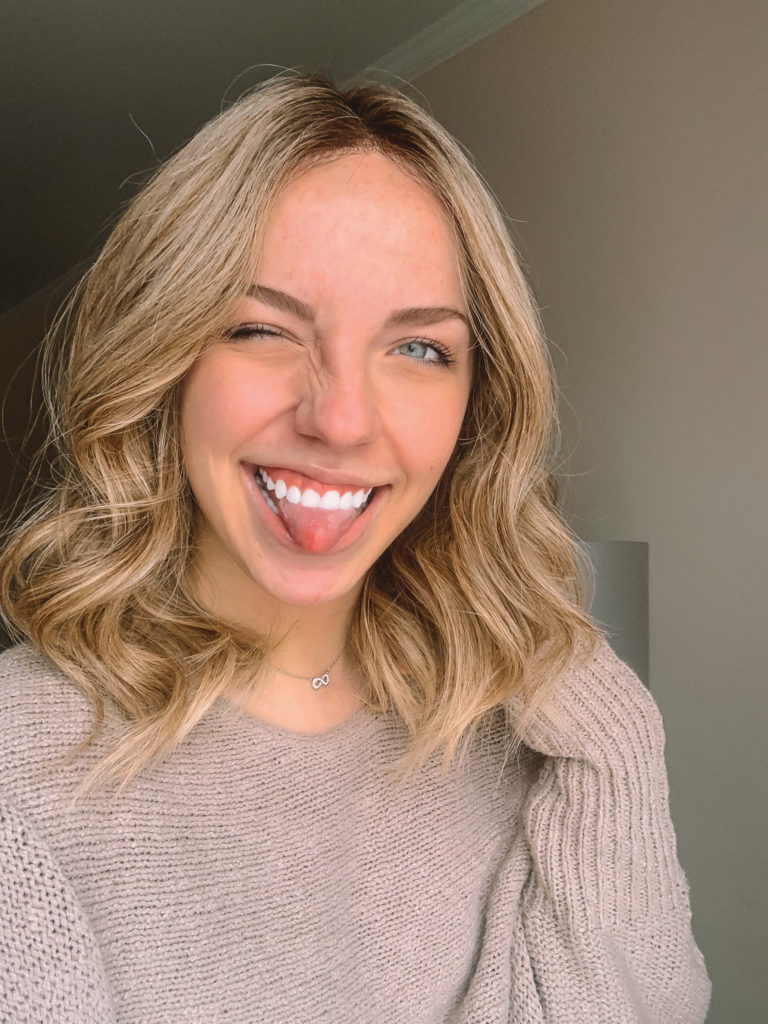
- Name: Mags Bujalski
- Age when diagnosed: 22
- Diagnosis:
- Non-Hodgkin’s Lymphoma
- Primary Mediastinal Large B-Cell
- Stage 4
- 1st Symptoms:
- Exhaustion
- Migraines
- Coughs
- Swelling in left arm
- Blue coloring on left arm
- Misdiagnosis: Lung infection
- 1st Line Treatment: R-CHOP Chemotherapy
- 6 cycles, each cycle = 3 weeks
- Outpatient: go into clinic for hours-long infusion one day per cycle
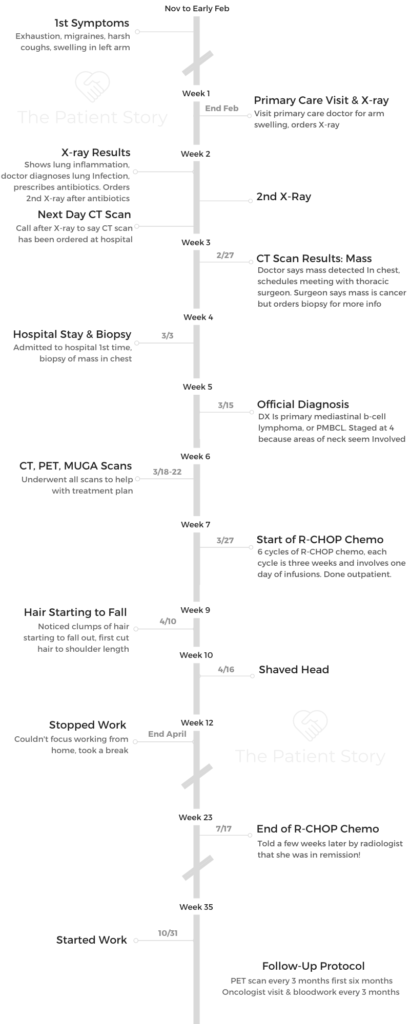
- Diagnosis
- What were the first symptoms?
- What happened at your first medical visit?
- When did you learn about the mass?
- What happened at the meeting with the thoracic surgeon?
- How did you process the initial news of a tumor?
- How did you break the news to your loved ones?
- Any guidance on how to start sharing the news?
- Describe the biopsy
- What happened after the biopsy?
- How did you get through waiting for the biopsy results?
- How did you get the news of the official cancer diagnosis?
- What did they know about the cancer at that point?
- Tip: Bring someone else to appointments and/or record them
- Treatment Plan
- How did you choose the oncologist?
- What were the next steps in planning treatment?
- How did the oncologist describe the treatment plan?
- What is a CT scan like?
- What is a PET scan like?
- What’s the MUGA scan?
- How did you choose which chemotherapy regimen to pursue?
- What made you go with an IV instead of a port or PICC line?
- When you officially got the cancer diagnosis, how did you break the news again?
- Deciding to share your story publicly
- R-CHOP Chemotherapy
- Hair Loss After Chemo
- Describe the start of losing your hair
- What did you do after noticing the hair loss?
- Describe dying your hair
- Why did you go to a hairdresser to shave instead of doing it at home?
- How did you feel when you had your head shaved?
- Did you wear anything after the hair loss?
- Why did you decide to get a human hair wig?
- Finishing Treatment
- Reflections
This interview has been edited for clarity. This is not medical advice. Please consult with your healthcare provider for treatment decisions.
Don’t be worried if the tests and treatments that you are getting aren’t the same as somebody else on the internet who has the same cancer.
Everyone’s body is different. Even though we have the same cancer, depending on our circumstances, our bodies handle things differently.
Mags B.
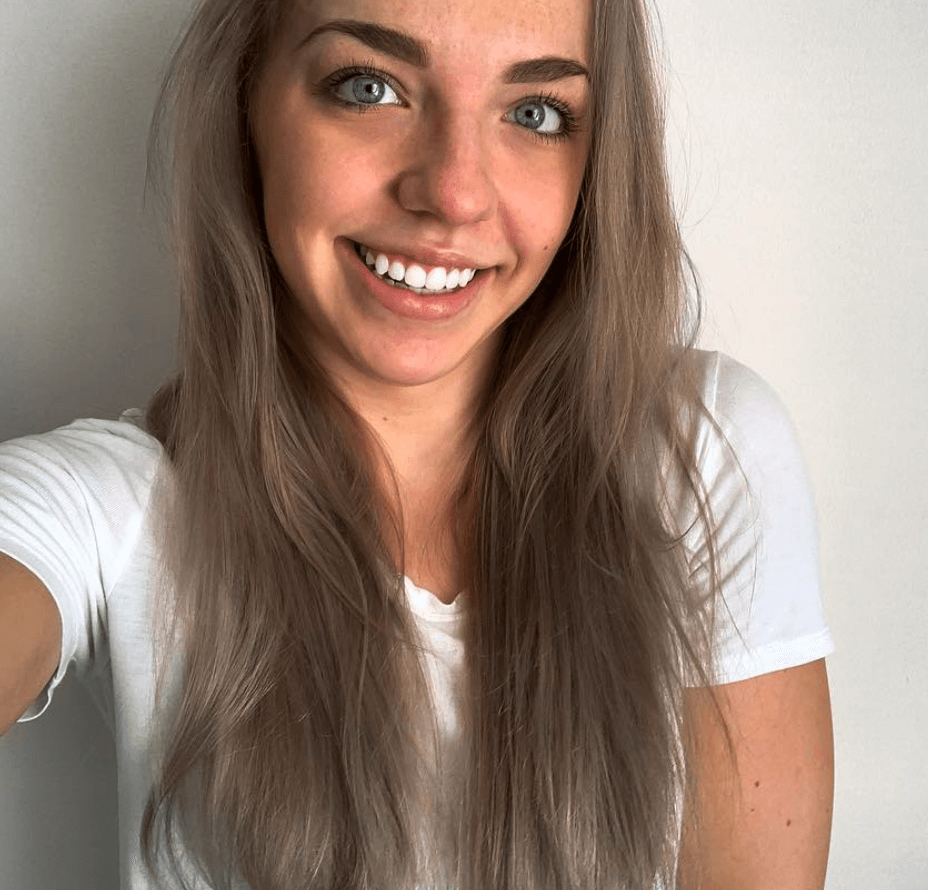
Diagnosis
What were the first symptoms?
I lived a really busy life; I was finishing up my degree, doing an internship, and working during the evenings and weekends as a server doing closing shifts. Anyone who has worked closing shifts knows they are late nights. I was really pushing myself.
In November, I was in the shower and thought to myself, “Nothing’s wrong. I can’t feel anything wrong physically, but something’s wrong.” I didn’t feel good, but I couldn’t pinpoint why. I let it go.
Then in January, I started getting a few weird symptoms, such as horrible aura migraines. I would normally get them once every few months, but now I was getting them often.
Once again, I really thought nothing of it. It was exam season, so I thought it was probably just stress.
What really set it off was a particularly cold week at the beginning of February. That week it was -50 degrees Celsius in Winnipeg, and I noticed that I had a really bad cough, which is not uncommon, especially when it’s cold.
I also had swelling in my left arm. I assumed that it was from me leaning on my office chair because that’s what I did at work. I figured I must have just tweaked a nerve or that leaning on my arm was cutting off circulation.
But when I was at the gym, I noticed that my arm was completely blue, like one big massive bruise. It didn’t feel like a bruise; it felt like tingling.
What happened at your first medical visit?
I went to the walk-in clinic the next day, and the walk-in doctor asked me all of the typical questions. One of them was, “Does cancer run in your family?” It did, unfortunately, but she didn’t alarm me about anything, so I just thought it was one of the questions she had to ask.
She then sent me for a blood test and an X-ray. The X-ray came back as inflammation in my lungs. She told me that it was probably some sort of a lung infection. She said, “I’ll give you antibiotics. When you’re done with the antibiotics, go for a follow-up X-ray.”
I did that, swelling went down, and I almost didn’t go for the follow-up X-ray because I felt totally fine. Then something inside me told me to go, and thankfully I did.
The next day, I got a really cryptic phone call from a hospital saying that I had a CT scan tomorrow morning at around 8 am. I told them I thought they had the wrong number. They said no, it was for me.
When did you learn about the mass?
I went to the CT scan wondering what was going on. Then the doctor called me, the one I went to see at the walk-in clinic.
He told me there was a mass on my lung, adding I had an appointment with a thoracic surgeon for further explanation. That’s a surgeon specializing in the neck and chest areas.
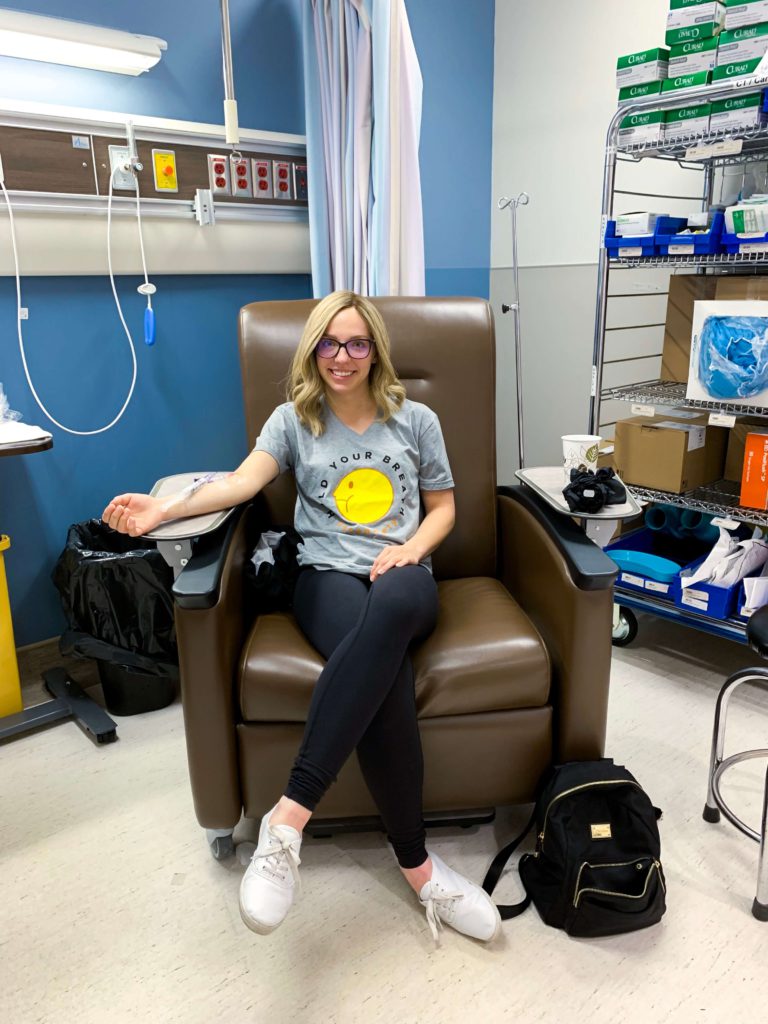
What happened at the meeting with the thoracic surgeon?
I knew that something was wrong, but cancer was not top of mind. I thought that maybe there was a growth or cyst or something. I went in there by myself jolly and happy, like, “Let’s get this over with and go to work.”
Right away he sat me down — he was the sweetest gentleman — looked me in the eye and grabbed both my hands.
He said, ‘You have a pretty big mass on your right lung. There’s 3 possibilities. All 3 are cancers.’
My eyes opened very wide. That was not what I was expecting to hear. At the time, my boyfriend, who I live with, was in Mexico with his friends. I started crying and didn’t even know what to do or think.
They wanted to do the biopsy that night, but I wanted my boyfriend to be there and wanted to wait for him to come home. I didn’t want someone else to pick him up at the airport and tell him what happened.
We put it off a few days until he got home. But that was basically it. The biopsy confirmed the diagnosis.
How did you process the initial news of a tumor?
I didn’t go to work and went straight home. I was literally numb. I sat on the couch for the rest of the day. I couldn’t believe this was actually happening.
I contacted a friend of mine from high school who had just finished fighting cancer a couple months prior. She was the only person who would get it at this point. I messaged her and told her that I was going through a cancer scare.
She said, “Whatever it is, I’ll help you through it. Don’t Google anything. Don’t think about things until you know what’s going on because you’re going to cause yourself extra stress.”
I didn’t go to work for the next few days. I just sat there, numb, at home, crying and watching Netflix while eating ice cream.
»MORE: Processing a cancer diagnosis
How did you break the news to your loved ones?
I remember going to the airport to pick up my boyfriend. It was probably one of the hardest things I have had to do in my life. I had to show up, act happy, keep it together the whole ride home and then tell him.
The surgeon wanted me to go to the hospital the next morning, so I couldn’t even put off telling him. I had to pick him up from the airport, right away sit him down on the couch and tell him everything.
It was so out of nowhere. It was definitely very tough.
As for my family, I went to my parents’ house, walked in and said, “I have something to tell you guys. Don’t freak out, but this is the situation. They found a growth in my chest. I’m having a biopsy to figure it out, and we’ll see where it goes from there.”
»MORE: Breaking the news of a diagnosis to loved ones
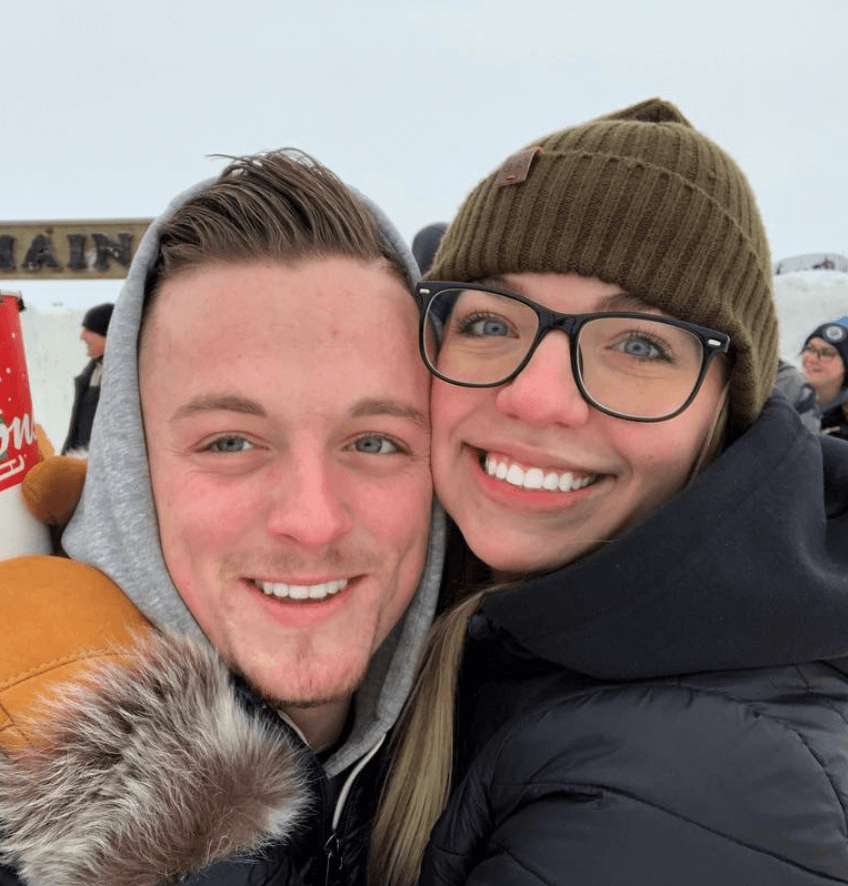
Any guidance on how to start sharing the news?
With things like my official diagnosis, I waited to even tell my family. My boyfriend was the only person who knew about my diagnosis for a few days because I needed to understand it and process it myself first.
It’s really overwhelming. You get so many questions, and you don’t even know the answers to these questions. It’s a very, very overwhelming feeling. People jump right away to asking what they can do for you and how they can help, but you yourself don’t even know how to feel.
My only advice is don’t rush. Process it first and then tell people. You don’t have to tell everyone, just tell who you want to tell.
Describe the biopsy
They asked me to come to the hospital. The operating room was fully booked, but because it was considered an emergency surgery, they were going to squeeze me in when there was an opening. We needed to get this biopsy done as soon as we could. We waited at the hospital until there was an opening.
They didn’t have any openings that day, so they sent us home. We came back the next day, and they told us to stay the night because they would likely have an opening the next morning.
Anyone who has stayed at the hospital knows it’s nerve-racking. I remember I could barely sleep that night. The next morning, I woke up very scared and nervous.
The surgeon told me that because of where the tumor was (under my rib cage, on top of my lung) and because there are so many vital organs in this area, they weren’t sure where exactly they were going to do the incision, how big it is going to be and how many incisions.
I’m really good with needles and medical procedures. That’s fine as long as I know what’s happening. In this case, I didn’t know what was happening.
The surgeon said, “We don’t know what we’re getting ourselves into until we cut you open.” At that point, I said, “Do whatever you have to do.”
They wheeled me in, and I remember I was so nervous, but you just have to let go and trust that you’re in good hands. Trust that everything will be okay.
Luckily it went really well. They made a small incision in my chest. That was their first try, and they were able to get whatever they needed from there.
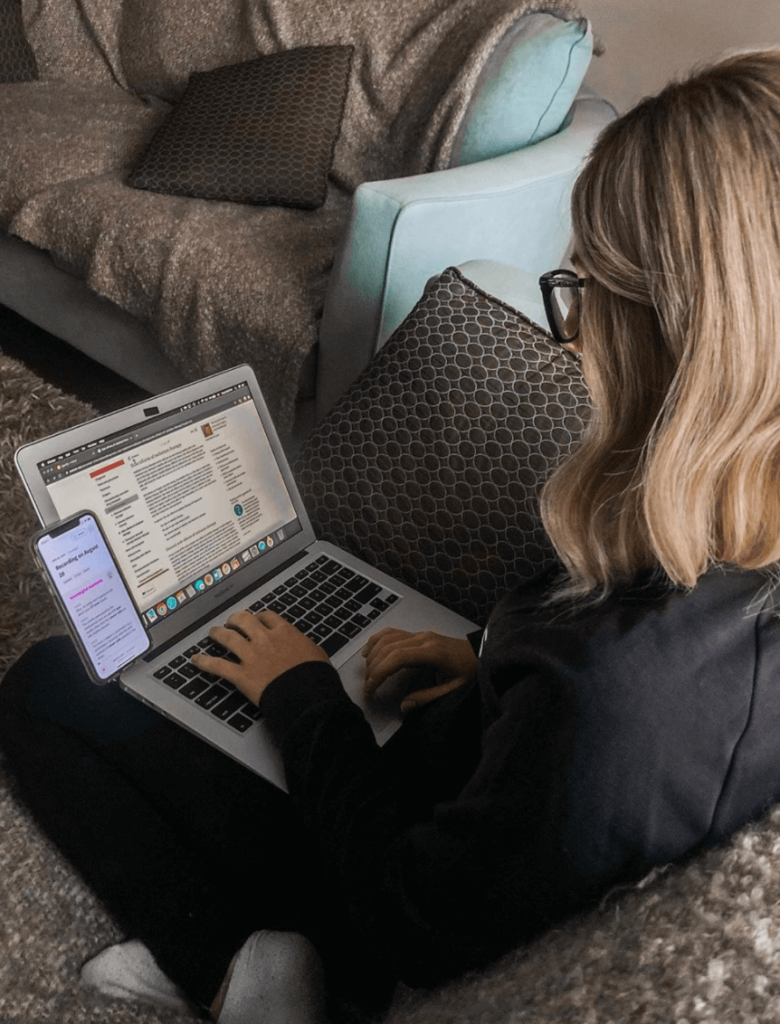
What happened after the biopsy?
I stayed in the hospital for a few hours. After I got up to walk around and ate a full meal, they let me go home for the rest of the night. I got painkillers to help me through the recovery.
I think recovery was also pretty tough because you don’t realize that the area around the chest affects your arm, your chest, your abdomen. I couldn’t really move around. The recovery was tough because I couldn’t really do much.
It took about 2 weeks to feel better. Just a lot of taking it easy and not using my right arm.
How did you get through waiting for the biopsy results?
It was about a 2-week period, which is a long time for biopsy results. I’m not sure why that happened. It was nerve-racking.
I think for most of the wait, I was distracted by the healing process. I tried my best to relax. My objective was to have the smallest scar possible, so I was trying not to overdo it.
After one week, I went back to work. I tried to keep my mind occupied. I feel like at that point, I had already accepted that it was probably cancer.
I’m one of those people who is like, “Okay, I’ve accepted it. Let’s move on and get it over with.”
How did you get the news of the official cancer diagnosis?
I was waiting for a phone call from the surgeon. I was sitting at work one day, and his nurse called me. She said, “We need you to come in for the results.”
I left work right away and unfortunately (but not really), the oncologist’s office called as I was driving to the appointment. Of course, we all know what an oncologist is, so I guess it ripped the band-aid off.
I feel like I would have had really bad anxiety sitting in the waiting room of the surgeon’s office, so maybe it was a blessing in disguise that I got that phone call so out of the blue.
As soon as they called, the nurse said, “We’re setting up an appointment for you to meet your oncologist,” and that’s when I knew that it was cancer. I didn’t know the details, but cancer is the only thing I needed to know at that point.
I went to the surgeon. He told me the diagnosis and gave me a little bit more detail. He told me that the next step was to meet with the oncologist.
»MORE: Read different experiences of a cancer diagnosis and treatment
What did they know about the cancer at that point?
The way the surgeon put it was, “I’m not a specialist, so I don’t want to give you the wrong information.” He said that I have lymphoma, told me the size of the tumor and where exactly it was located. That’s about all the information he gave me.
Then I decided to be a little sneaky. I had bandages on my biopsy incision, but the incision was too big for regular band aids. I asked the nurse if she could get me more hospital band aids.
The surgeon and the nurse both left the room, and I saw that they had a piece of paper on the desk. I took a picture of the paper, which had the results of my biopsy.
The diagnosis was primary mediastinal b-cell lymphoma. [There were] a few more scientific and medical terms on it that I didn’t know but later Googled. I had to figure it out on my own.
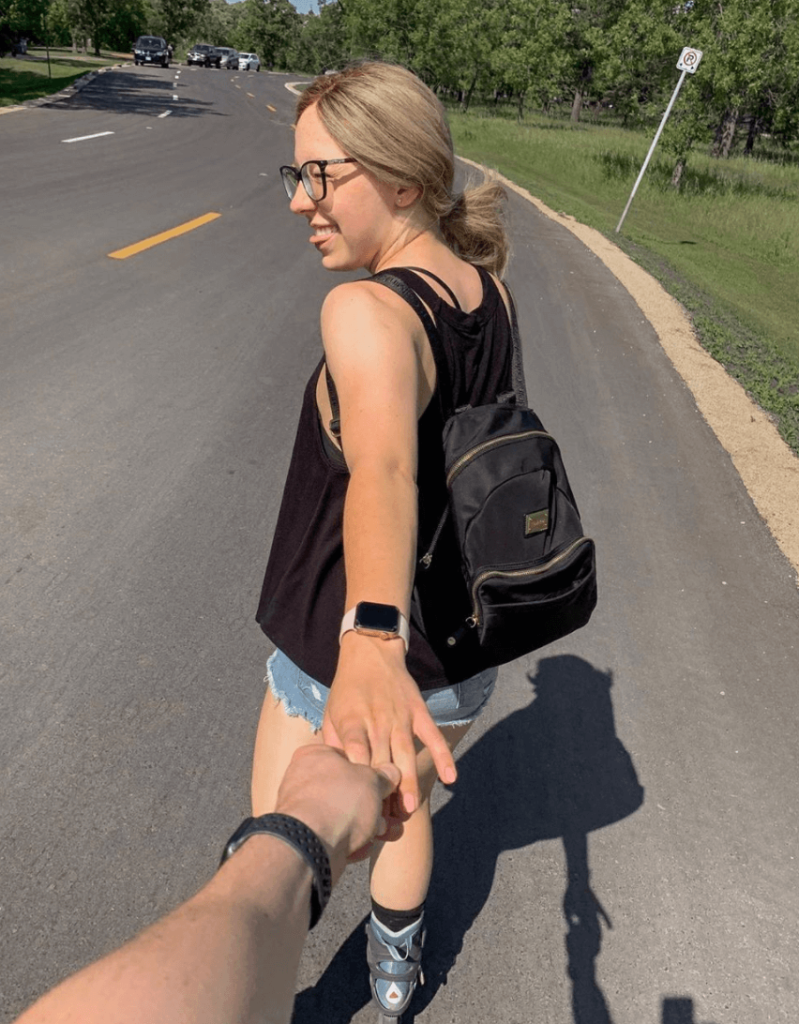
Tip: Bring someone else to appointments and/or record them
Have another set of ears and eyes in the room. I don’t know how to put this, but someone who’s not emotional. It’d be really hard if you’re trying to keep it together and the person next to you is crying or freaking out. That makes it harder on you.
Luckily, my boyfriend is super strong and was there holding my hand through my appointments. Bring somebody who will be there to help you out, who you trust with this information.
Otherwise, record it. Taking notes is probably not the smartest idea because you’re trying to remember, think and write stuff down all at the same time.
If your oncologist is okay with it, ask if you can record the whole appointment. I know there are apps that will record and transcribe, so you can do stuff like that as well to help you remember.
There’s so much information being thrown at you that you’re not going to be able to absorb it all. You can also ask if they have booklets or information that you could also read afterwards.
Treatment Plan
How did you choose the oncologist?
The hospital referred me, so I’m not sure if that was the oncologist who the surgeon thought was the best or if that’s whom they send patients to automatically. I have no idea.
I just trusted the system. I trusted it because we have a really good cancer research center here in Winnipeg, and I know the doctors are good. Since Winnipeg is a smaller city, all of the hospitals work under one system.
I didn’t want to go on the Rate My Doctor websites because I knew there were going to be bad reviews and good reviews. I knew nothing about oncologists, about that region of health or anything like that, so I thought, “Who am I to do my own research and stress myself out more when I honestly have not the slightest clue about oncology?”
What were the next steps in planning treatment?
I had a scan the morning right before I met the oncologist, the MUGA (multigated acquisition) scan for the heart to see how my heart was doing and whether the tumor was blocking the blood flow to my heart.
After the scan, I met with the oncologist. It was the initial appointment explaining which drug was going to do what to me and how it was going to affect me.
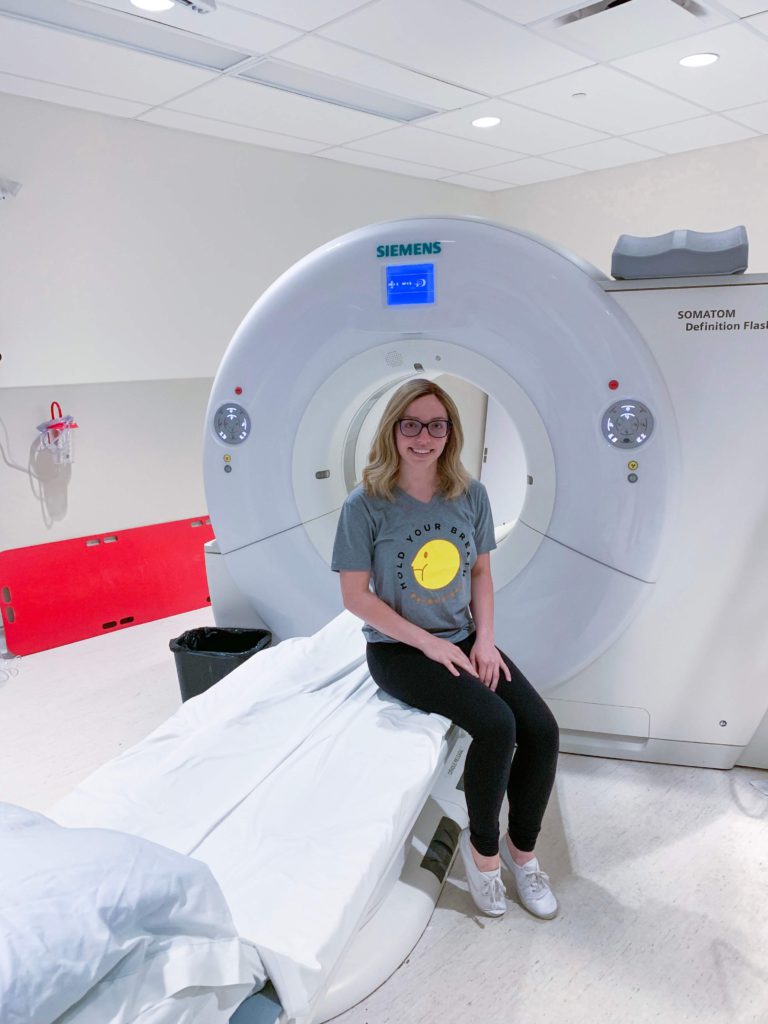
How did the oncologist describe the treatment plan?
She told me that the exact type of cancer was called primary mediastinal large B-cell lymphoma. There was a tumor in my chest, and she told me the exact measurements. I was also getting cancer cells lighting up in my neck, so she said it was spreading to my neck, which is why we needed to start treatment as soon as we could.
Like most people, I was very numb. I didn’t cry. I just let all the information come and absorbed it as much as I could. Luckily, I had my boyfriend there, who was a second set of ears because I honestly didn’t remember everything.
Then she explained that before the treatment began, they wanted to make sure that they had as much information as possible. I had one more PET scan and CT scan to see if the tumor had grown, to see how aggressive it was compared to the first scans, which were a couple weeks prior.
She wanted to have the best understanding possible. A few days later, they called me and said, “Hello, you’re starting chemo on Wednesday. Get ready.”
What is a CT scan like?
The CT scan is the easiest but also the most uncomfortable. It’s like a donut tube. You go in and out of the tube a few times, hold your breath a few times. They gave me this thing called contrast. I’ve seen some people have to drink fluid, but I never had to drink anything.
I just got this IV contrast, which is basically something that helps the images show more of what is going on inside. When they inject the contrast through you, you get this sensation of a hot flash from head to toe, and you feel like you just peed yourself. You never do pee yourself, but it’s the most uncomfortable feeling in the world. The scan is super quick; it’s usually only 15 minutes.
What is a PET scan like?
The PET scan is a more detailed version of a CT scan. Same kind of thing, they put this radioactive sugar into your blood and because cancer cells love glucose, they attach to the radioactive sugar, and it lights up where there’s cancer in the body.
That’s usually the scan that people have throughout their treatment to see if the tumors are shrinking or where exactly the cancer is.
That one’s a little longer. It’s about an hour or hour and a half because you have to wait for the sugar to go through your body, and then you go in the donut-shaped machine for 20 or so minutes.
What’s the MUGA scan?
It might be a different name in the United States, but they basically check your heart, how it’s working, how it’s beating. Then they again check after chemo to see if there’s been any damage.
The chemo I was on specifically could have affected my heart, so that’s why they wanted to know what they were starting with and what the end result would be.
How did you choose which chemotherapy regimen to pursue?
The oncologist gave me 2 options for chemo and asked, “Which one would you like?” I was like, “I don’t know. I trust your judgment.” I didn’t even want to look into it because it would be more stressful for me.
My oncologist said that we should go with R-CHOP. Then she gave me a booklet with all the information about the chemo regimen and the drugs. She then summarized it, saying, “This drug does this, and these are the side effects.” For example, “This is the Red Devil. It’s the one that makes your hair fall out.”
She walked me through everything, how the sessions were going to look, asked if I wanted a PICC line or a port, or if I wanted to do IV. I chose to do IV. [She described] what an average chemo day would look like, how the first session would be different from the rest.
Then we talked about the possibility of not being able to have children, the possibility of menopause, other potential side effects that could have happened.
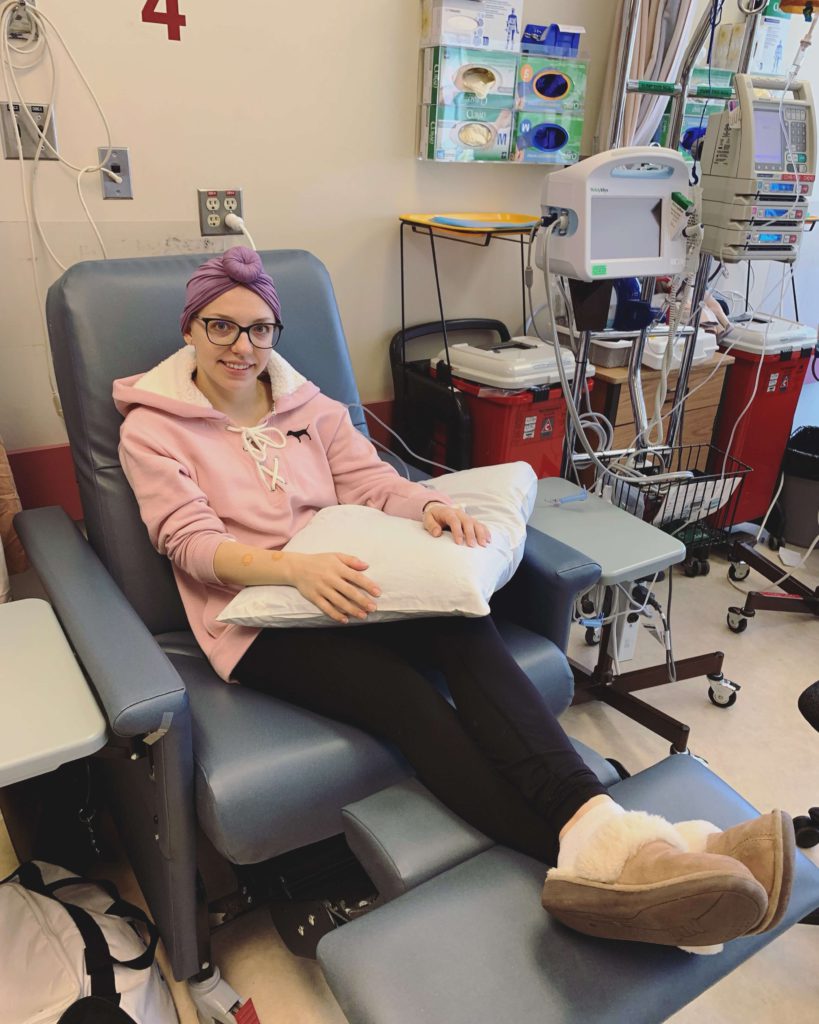
What made you go with an IV instead of a port or PICC line?
I know it’s not an option for everyone. It was for me because they were under the impression that I was only going to have 6 sessions, and it was only going to be a few hours at a time.
It wasn’t like I was in the hospital for a week at a time, like some chemo regimens. They did walk me through the ups and downs of every option.
I didn’t want the PICC line because I’m a relatively active person, so I was just worried that I would accidentally hurt myself, rip it out. I was scared of the idea of having it there.
As for the port, it sounds shallow, but I was already very self-conscious of the scar on one side of my chest. I didn’t want another scar on the other side.
I opted for doing the IV. I knew there were risks associated with that, but I was willing to take my chances. It worked out.
I had trouble with veins some days, but I feel everyone at some point has trouble with their veins, where they don’t want to cooperate with you that day. But it was okay because I am okay with needles.
When you officially got the cancer diagnosis, how did you break the news again?
I’m not a very emotional person but my family is, so I just took the approach of telling them the bare necessities. I told them the facts that they needed to know without getting into too much detail.
I told them what the plan moving forward was and said, “I’m going to be okay. Anything serious, I’ll update you.” I just didn’t want to get too into it because it would scare them, and I knew their reactions would affect me.
When I had all the information, when I was ready and got the crying out of my system, I went over to my parents’ house and was like, “This is what it’s called, this is the staging, and this is what we’re going to do. My chemos are going to be this and this day, this is what’s going to happen, and I’ll be fine.”
Deciding to share your story publicly
At first, my idea was to disappear under the radar for a few months and then come back. Then I got this idea to put it on YouTube because when I first got my diagnosis, I didn’t know what lymphoma was. I didn’t even know what chemo looked like. All I knew was that you lost your hair.
I’d go on YouTube and Instagram. I couldn’t find a lot about this cancer. There were a few Instagram profiles that I found for cancer survivors and some channels on YouTube, but it was either about pediatric cancer or older people going through cancer or doctors talking about cancer. There was nothing really about young people that I could really relate to.
I thought to myself, ‘This is something that I need to do.’ At the time, I wasn’t aware of how many young adults are affected by cancer. You always associate it with either something that older people or little kids get.
I had this idea but didn’t know anything about videos or recording. I was chatting with my boyfriend in the car a few days before I started treatment.
He said, “Why don’t you take advantage of the fact that you’re going to have time off and occupy your time with either putting it up on YouTube or writing a book? Something to share your experience and keep you busy so you’re not sitting at home, stuck in your thoughts.”
That was the push I needed, because the idea was already there. I just needed the push. I did the complete opposite of going under the radar and put it on Instagram, put it on YouTube. I have stuck with it until this day.
It was also good for me because I didn’t have to separately give people updates. I can do it all at once. It was less painful for myself.
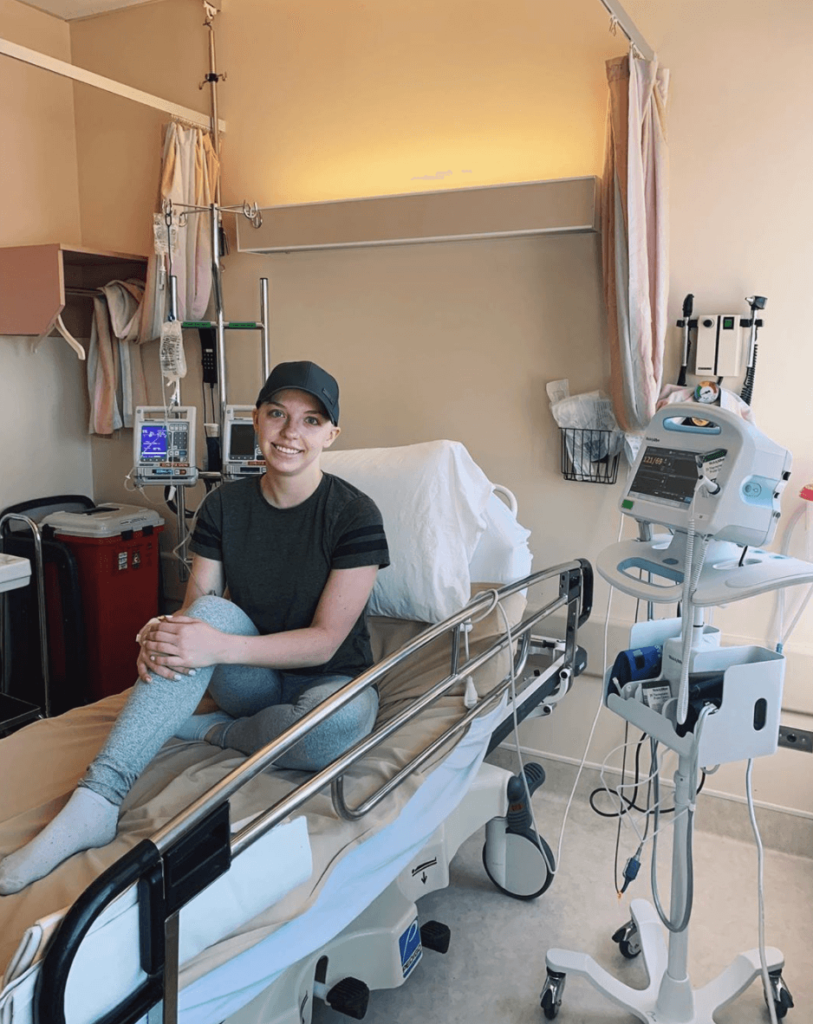
R-CHOP Chemotherapy
Describe the process of the chemo infusions
I went to the hospital, got the blood work done. They split my first chemo treatment into 2 days because they didn’t want to overwhelm my body. I got 3 out of the 5 chemo drugs the first day.
That day, I didn’t have any side effects. I just remember being all chipper in the chemo room, everyone was looking at me like, “Why is this girl so happy?” I just wanted to get it over with because it was what I had to do.
My boyfriend was there. We were vlogging and having a good time. Luckily, the nurses at the hospital were all super happy-go-lucky, joking around. That’s what you need. If there’s a happy nurse, that just makes all the difference. They were telling me what was going to happen and making jokes, conversation. It was so chill!
I didn’t even really feel like I was getting chemo. I went home that night and felt like my sinuses were clogged up. The next morning, I woke up and had my prednisone moon face. Then I went to the hospital and received a drug that patients often have an allergic reaction to, which is why I had the last 2 drugs on a different day.
They wanted to administer them to me slowly first because they wanted to make sure I wasn’t going to get a reaction. That was a whole 8-hour infusion.
I would go in for my treatment usually in the morning around 9 and probably leave around 2. Eventually, they were able to give me the infusions in larger doses, more quickly, if my blood levels were okay.
It would be every 3 weeks. It’d take me about a week to recover, then 2 weeks I’d feel okay, then another infusion (6 times total).
What were the R-CHOP side effects?
Summary: Nausea, sensitive to smells, headaches, numbness (neuropathy), acid reflux, mouth sores
I remember the side effects were not that great, and I didn’t have my tips to manage them yet [the first cycle]. Usually that same evening I’d feel pretty okay. The next morning is usually when everything hit. I had really bad nausea and was very sensitive to smells.
For the longest time, we couldn’t cook anything that had any sort of smell because I’d get so sick and wouldn’t be able to look at that food. I don’t know if this is common, but the first meal I’d eat after treatment when I’d get nauseated, my brain would associate the nausea with that meal. I couldn’t look at hot dogs or anything for a long time if I ate one right after treatment.
I got really bad headaches all the time from the chemo. I had mouth sores for a little bit. Those were absolutely terrible. I couldn’t even eat. I was bawling my eyes out because I was so hungry, but even closing my mouth hurt so much.
I would get numbness as well. There were a bunch of smaller side effects. My stomach would get acid reflux, so I had to get different medication for that.
What helped with the chemo side effects?
I did get medications from the hospital for the nausea, but I found that it didn’t really help me. What did help me was ginger. I’d take ginger pills or drink ginger tea, which really helped me. Also, snacking on foods with small portions.
If I got too full, I’d feel more sick, so I’d do smaller snacks throughout the day to keep something in my stomach, but not to get me full. I’d also get crackers, bagels, popcorn — anything that was carby that could help me feel full but didn’t necessarily have a smell.
For the headaches, I tried a million different things. I really didn’t want to take strong drugs because I was already on too many drugs. I didn’t want to take anymore unless it’s absolutely necessary. I would do cold or hot baths, depending on how I was feeling. I would have a wet towel on my head. I even tried using essential oils to help with the headaches. Just being quiet, taking lots of naps.
For the mouth sores, I had to get a prescription medication because there was nothing that could help without a prescription. Someone told me after I finished chemo that if you chew on ice while you’re getting your infusions, that helps somehow, so I know some people would just bring ice. I never tried it, but it’s worth trying to avoid mouth sores.
Having more information helps dealing with side effects
Even the placebo effect, maybe if it’s not really doing something. [If] in my mind I’m like, “This will help me,” automatically that could help.
After experiencing the side effects after the first round, it was nice to have a list of what to do when this happened or that happened.
»MORE: Cancer patients share their treatment side effects
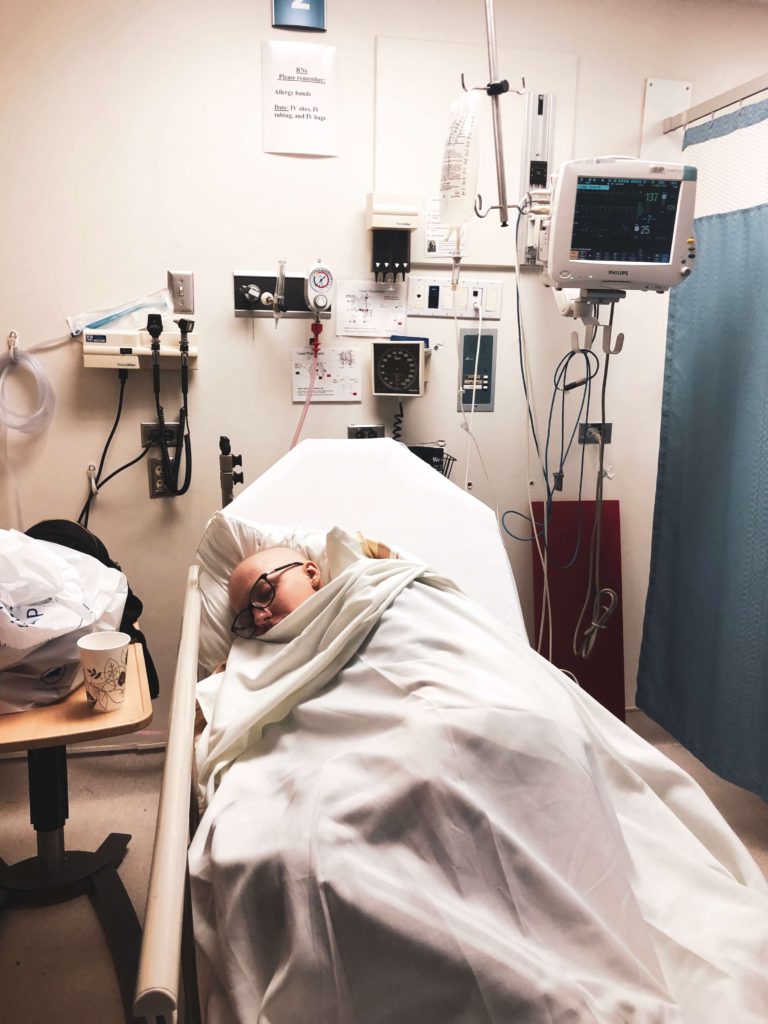
Could you keep working through chemo treatment?
Initially, I wanted to work. I asked my oncologist what she thought. She said, “Most of my patients on this chemo regimen don’t go to work anymore because it is pretty intense. You can do what you want. I’ll give you a note and just submit it as soon as you feel the need to.”
I wanted to work through it. My employer told me that I could work from home. After my first round of chemo, I did return to work and found it to be really hard.
I couldn’t concentrate, and being a translator, you need to be able to focus. I just knew I wouldn’t be able to give them the best quality work.
I didn’t want that to affect my future if I wanted to work there.
I also wanted to be able to recover and take a nap whenever I wanted to, so I just figured it was the best situation for everyone if I took time off.
Any guidance on dealing with work during chemotherapy?
It’s a very intense adjustment, especially because I went from living a very, very active lifestyle to being essentially couch-bound for a very long time.
It is a huge adjustment, and it was emotionally very hard to make that adjustment. I was used to having plans and always having something to do and somewhere to go. I went from that to lying on the couch, staring at the ceiling.
As for working during treatment, try it out if you think you can work and if your job isn’t physical work. If your job is physical work and you have to leave the house, you increase the chance of getting exposed to germs because you really can’t get sick when you’re on chemo.
That’s the biggest thing, trying not to get any germs and get sick. If you have the possibility to avoid that, definitely try it out if you think you can make it work.
I think talking to your employer is the most important part and letting them know what’s going on. Just like you didn’t know about cancer before you got sick, they won’t know much about it either. Definitely talk to them and try to work out a plan if you can.
Do what you feel is right.
»MORE: Working during cancer treatment
Hair Loss After Chemo
Describe the start of losing your hair
It was exactly 2 weeks to the day after my first chemo. I was talking to a friend who asked if I’d started losing hair yet, and I was like “No, this is awesome. My hair is still here! My next chemo is in a week, and I still haven’t lost any hair.”
Then the next morning, I was sitting at my computer working from home and had my hands in my hair. I pulled out a clump. I was like, “Oh no, here we go.” I went to the bathroom and did the whole “Whoo!” (tossing hair) and a bunch came out.
It wasn’t crazy at first. It was a few strands, like 5 hairs at a time, which is still is a big deal when you’re losing your hair.
»MORE: Dealing with hair loss during cancer treatment
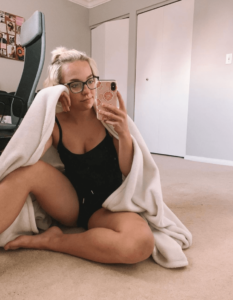
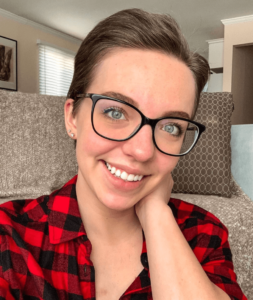
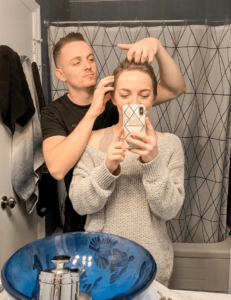
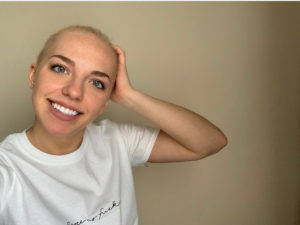
What did you do after noticing the hair loss?
I just left it. I wanted to hold onto it for as long as I could. The next morning, it was all over my hoodie. Then 2 days after that, it was everywhere.
It was unbearable. I would be outside in the wind, and you’d just see hair coming out. I called the place where I had decided to shave my head and was like, “I need to get rid of this.”
At that point, it was more painful watching my hair fall out. It was mentally harder to see blonde hair everywhere and keep vacuuming it, and at that point I had really long blonde hair.
I did end up cutting it to my shoulders for a bit to see what it would look like. I always wanted shoulder-length hair, so I was like, “Why not?” I also dyed my hair gray because I didn’t care about damage at this point. About after 6 more days, I had to take it all off.
By the time I went to see the hairdresser who shaved my head, I already had bald patches on both sides, and also on the top of my head there was a big bald patch, so it looked pretty sad.
Describe dying your hair
I was someone who always cared about their hair and wanted strong, healthy hair. I’d always do minimal heat, really nice products, and had really nice, long hair. I never dyed it because I didn’t know if it was going to look good and if it was going to damage my hair.
After realizing that it was going to fall out anyways, I thought, “Why does it even matter?” I decided between pink and gray, but I wanted to try gray out. I dyed my hair at home. My boyfriend and I did it together. It was a fun memory.
Why did you go to a hairdresser to shave instead of doing it at home?
The girl I had contacted when I first got my scare, she went through it, and there’s a wig center in Winnipeg where they sell wigs to people who lose their hair to chemo, or who have hair loss.
They also offer the service, when you purchase a wig, that they’ll shave your head for you and tell you how to properly care for your scalp. They walk you through what it’s going to look like. The lady who did it had a lot of experience.
I decided to go to her because I figured she knew what she was doing. It’s hard to ask somebody to do it, too.
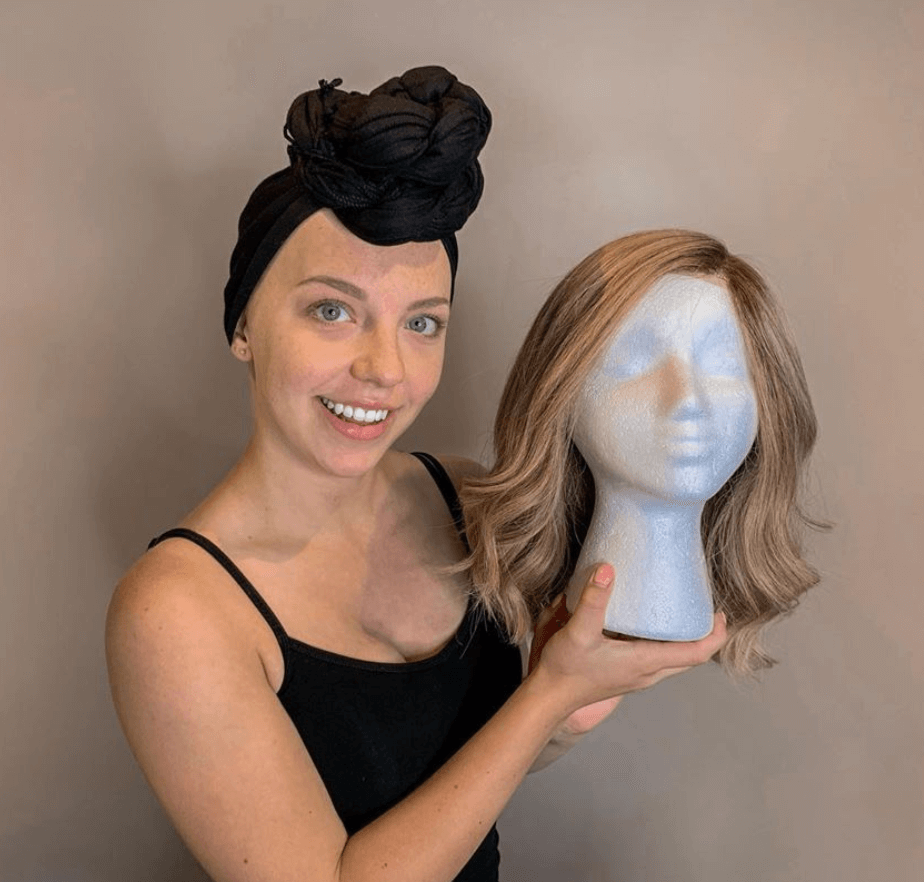
How did you feel when you had your head shaved?
I was worried that I was going to cry. I thought I was going to be a hot mess, but I got there and was like, ‘This is the next step. This is what I have to do. Let’s do it.’
I just sat there. We were having a normal conversation while she was shaving all my hair off. I looked at myself and thought I looked pretty cute, honestly, so I thought that it wasn’t too bad.
She didn’t shave it completely. She did leave about an inch of hair to let it fall out on its own to prevent ingrown hairs.
I had a buzz cut, essentially, with a few bald patches. I felt empowered and said, “Let’s just do this. Let’s keep going.” It was such a cute little shave!
Did you wear anything after the hair loss?
The first wig I got was from the salon. I bought the wig quickly after I got the call that I was starting chemo soon. I knew that hair falls out right after chemo. I didn’t know exactly how many days I had. For this wig salon, you had to order them, and it took 2 to 3 weeks.
I thought to myself, “Oh no, I need a wig as soon as my hair falls out.” I was scared of the fact that I would be bald, because who wouldn’t be? I didn’t do research; I didn’t know much about wigs. I got the first wig that I saw. I can’t say, “Take your time wig shopping,” because some people don’t have that time.
If I had more time, I would have done a lot more research because I paid a whole lot of money for it. It didn’t really feel like me.
I would have probably gotten something that made me feel more comfortable at first.
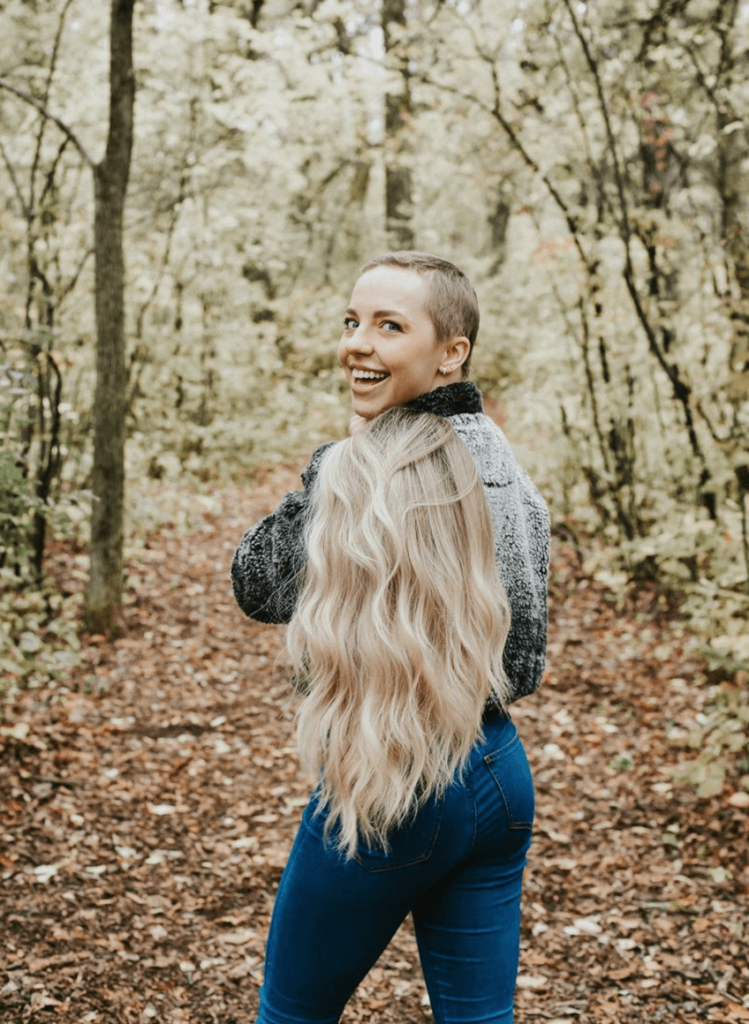
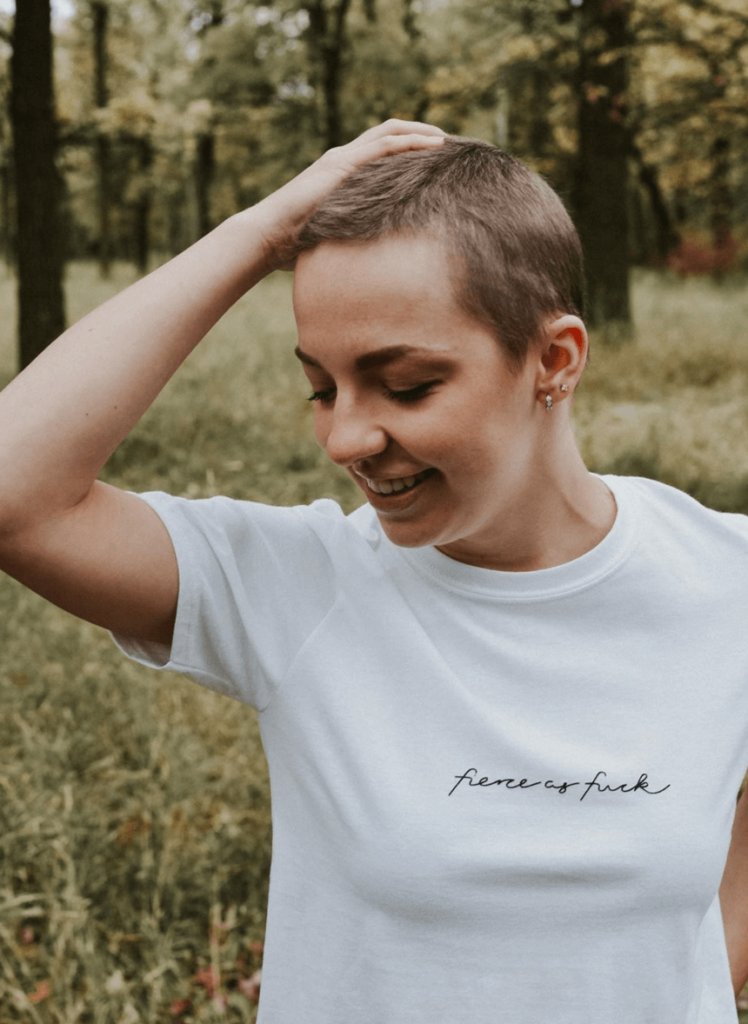
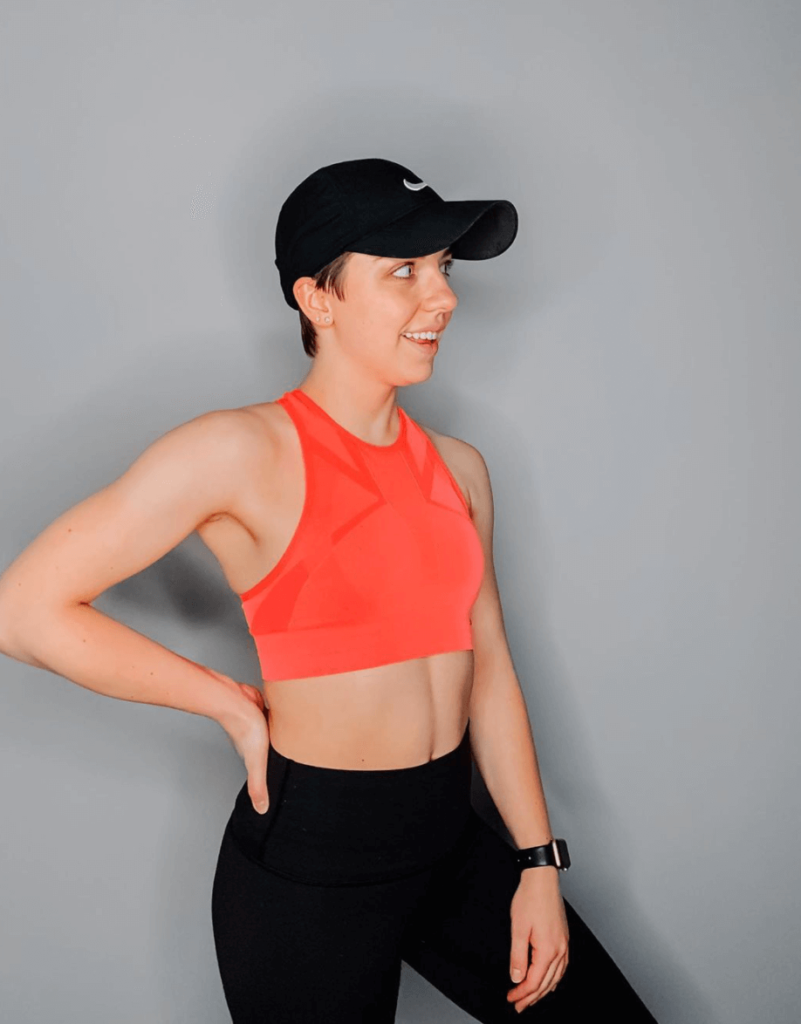
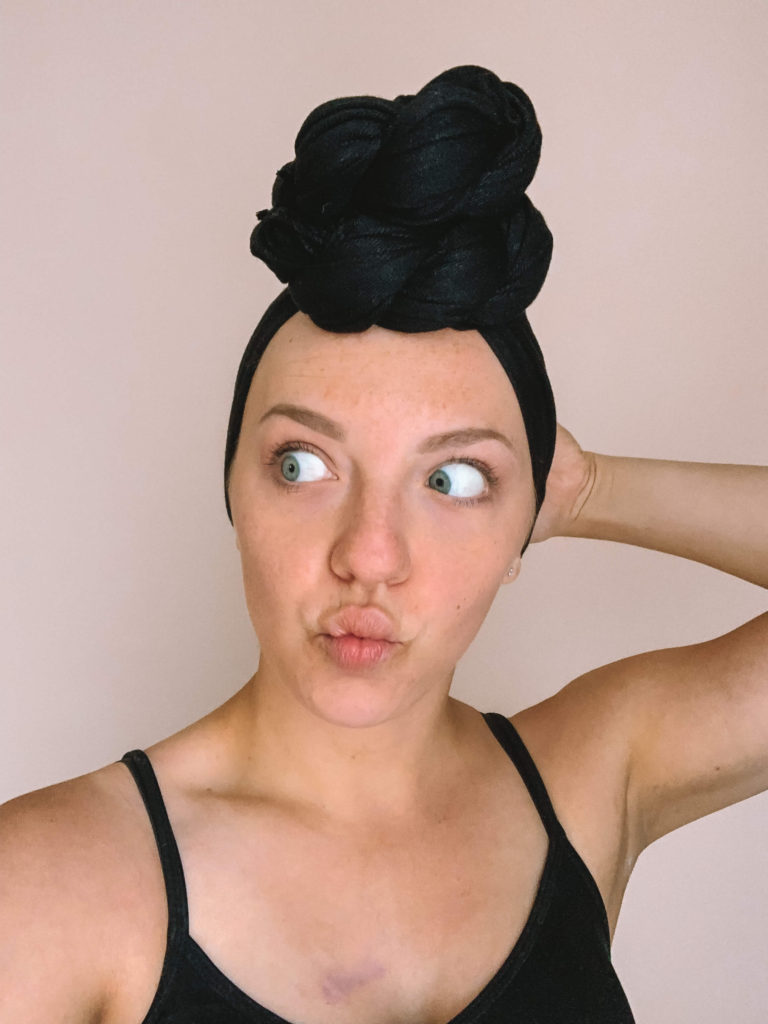
Why did you decide to get a human hair wig?
I decided to get a human hair wig because I knew I would wear it a lot and that it would last, maybe look more natural. I really wanted it to look more natural.
I also got a few beanies and also got the cap with the hair. The cap has synthetic hair on it but is really convenient for going out or going to the grocery store or when you want to wear a hat.
I ended up getting more wigs and a few months later found a wig that was perfect for me. It took researching, looking into it, stuff like that.
Finishing Treatment
How were your scans during and after treatment?
I got my scan after my fourth cycle of chemo. That basically showed that there was nothing in my neck anymore and the tumor had significantly shrunk.
It had shrunk to about one third of the size, so they were like, ‘Okay, we have one third of the chemo left. It’s one third of the size. This is looking really good.’
My oncologist told me that we were going to continue with chemo and do another scan after that, and then we’ll see. Radiation was on the table, but it wasn’t something that I was going to do for sure. It was a, “Maybe, we’ll see.”
I did the last 2 cycles, and the scan after showed that there was still some type of activity, but they weren’t sure if it was inflammation or still active cancer cells. We waited for a little bit.
I got another scan a few months after that. It showed that the activity was going down, so they said they thought it was just inflammation. “We’ll keep an eye on you for the next few years. If anything comes up, we can do radiation.”
Essentially, it was my choice at the end of the day, but I didn’t really want radiation. I didn’t want more treatment. I didn’t want to affect my body any more than I already had. I told myself that if I ever need it, I’ll get it. But at the moment, let’s just keep monitoring with scans.
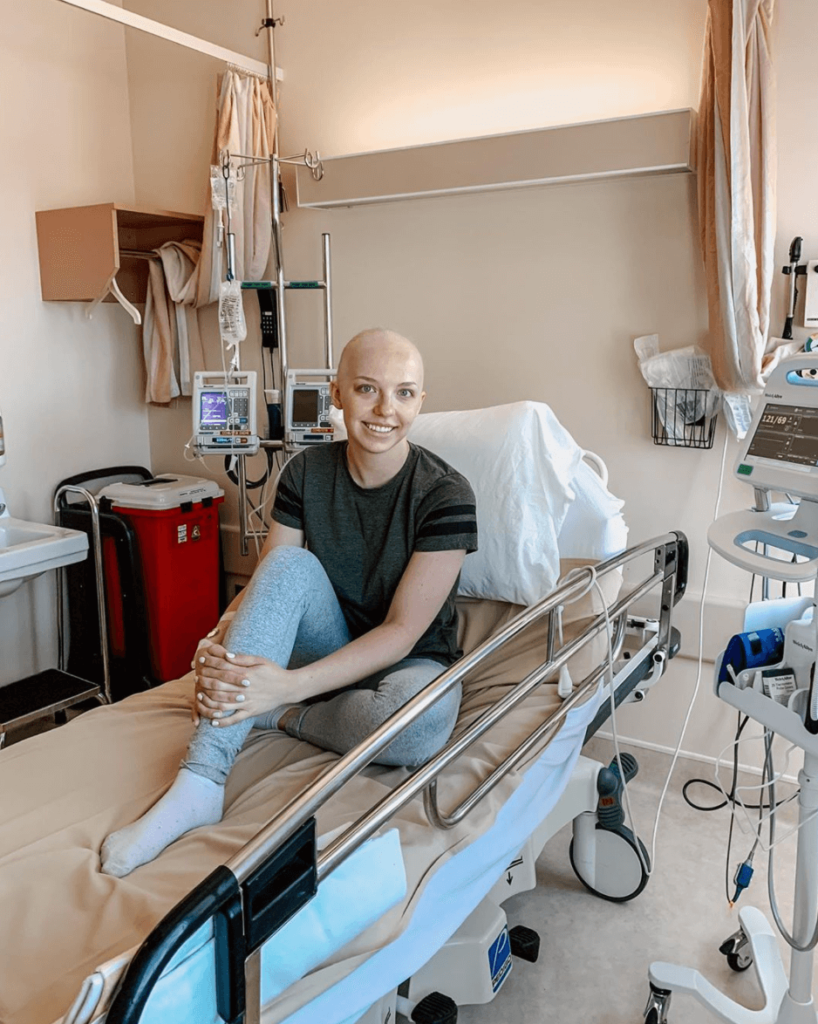
What’s the follow-up protocol?
I had 2 more PET scans after that, and they all showed slightly decreasing and decreasing [activity], meaning it was probably all inflammation just going down slowly, which is pretty common to still have in the scar tissue where the tumor was.
We decided to do blood work from now on, and if I have symptoms or am not feeling well or if I want a scan, I can get one. As of now, exposing me to extra scan radiation is not necessary.
When did you get the news of being in remission?
I got it from a radiologist. My oncologist never told me the word “remission,” so I wasn’t sure what my status was after finishing chemo. I had a meeting with the radiologist to talk over what I was thinking and what he was thinking in terms of radiation. We both decided not to do it, but he said, “You’ve been in remission since your last chemo.” I was like, “Oh, no one ever told me!”
To me, my remission day is the day I found it out from him, whereas the actual date is a few weeks prior. But that was the day that I officially found out and the day that I felt like I could take a deep breath.
How did you process being in remission?
I think my oncologist just didn’t want me to think that I was all better and all done. I think she wanted me to consider my options of doing radiation or not doing radiation and monitoring. That might be why.
I cried tears of joy. I had this feeling in my gut that holding off on radiation was the right decision to make. I think the radiologist just confirming that made me feel like I was making the right choice.
I was like, ‘Finally, this is over. I get to start slowly going back to work. I get to slowly start having my life back.’
I remember it was such a good day, and I think I cried the whole evening out of joy. I was like, “Life is good. Let’s get back to normal.”
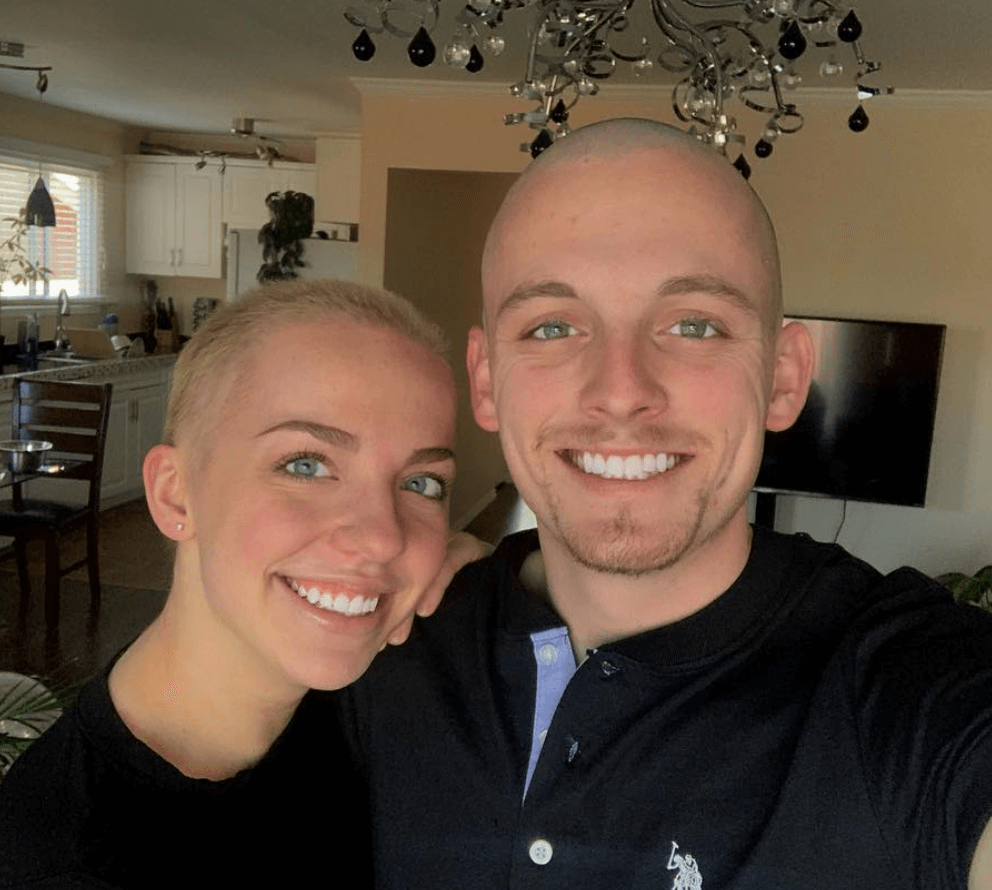
Reflections
Did you feel you got enough support during treatment ?
I’m one of those people who says, “If I can do it myself, I’m going to do it myself.” It was a lesson that I had to learn to accept help. I did lean on my boyfriend a lot.
He was my caretaker, and I owe him the world for doing all of that for me.
I had a really good group of friends who’d come in and check in on me. Overall support was really good as well. From social media, it was also very helpful to connect with other people who had this type of lymphoma because it’s on the rarer side for lymphomas. It was really good support to be able to ask questions to people who were already in remission.
Any tips on how to ask for help/support?
As far as for the patient, ask for help when you need it. It’s okay to ask someone to do your laundry for you, to clean your house for you, to bring you food.
You have to let your guard down and realize that this is a time in your life where you do need help, and it’s okay to ask for help.
There are people who love and care about you, who genuinely want to help you from the bottom of their hearts. You’re not asking for too much; you’re not being needy. You need this right now, and just accept it.
As for the caretakers, I know a lot of people have reached out to me, asking, “Hey, you’ve gone through this. I know someone who’s going through it, but I don’t know how to help them. What do I do?”
You can always reach out, and this goes for someone going through cancer, too. Talk to someone who has gone through something like that. It can be helpful for both parties to be able to relate and talk to someone who understands.
If you’re trying to be a caregiver, be specific about how you want to help them. Don’t overdo it. If they say they’re okay and they need their space, just go with how they feel.
It’s super weird because one day you feel fine, then one day you wake up and you feel awful. The third day you wake up and feel fine as well. So play it by their books.
Ask them what they want. A big thing I say is if they have children, they care about their children more than they care about themselves, so help the children. Offer to look after them or bring something to distract them, stuff like that.
Deciding whether to pursue fertility preservation
Unfortunately, it wasn’t really an option for me because we needed to start chemo right away. I don’t know much about the preservation, but I know it takes a few weeks.
We didn’t have time. My oncologist was like, ‘Sorry, this isn’t an option for you.’
However, she did assure me that since my tumor was up in my chest, the chemo was more centered up here, rather than where my reproductive system is.
She said the chances are high that there would be minimal or no damage, but, of course, they can’t promise anything. I was able to maintain a period throughout my whole treatment, which is amazing and a good sign.
As far as whether I’m fertile or not, I haven’t looked into it. I’m not planning on having children anytime soon, so for me, it’s a “we’ll cross that bridge when we get there” situation.
I definitely would have loved to have been able to freeze my eggs because it would have provided peace of mind. That was a huge concern and worry of mine, but that’s something I have to put in the back of my mind and say, “You know what, there are other options out there.”
I had to do chemo to save my life. I didn’t have a choice. It was spreading aggressively and was not worth it to wait if waiting could make my cancer a whole lot worse.
»MORE: Fertility preservation and cancer treatment
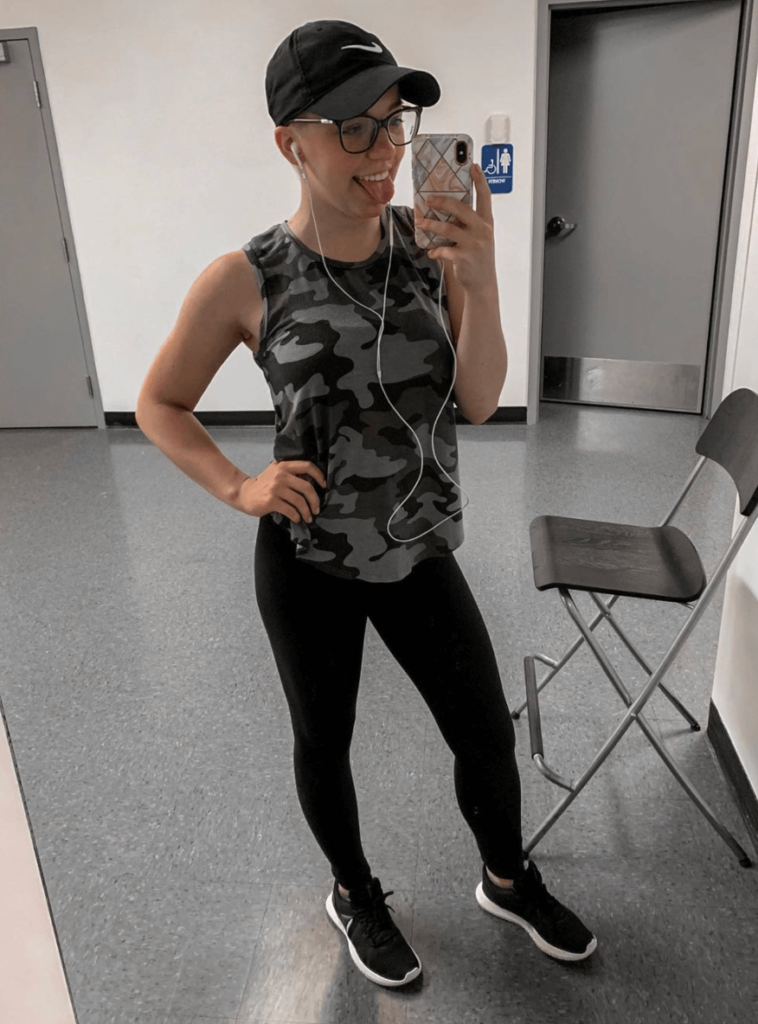
How has going through cancer so young shifted your life perspective?
I’m a strong believer in everything happens for a reason. Even with this, I think it happened for a reason. I think it definitely showed me a lot in life. It taught me an incredible number of lessons. It opened up my eyes to so many things.
Having been through cancer, I definitely made a lot of switches in my life. Healthy lifestyle, being more active, more conscious of how bad the foods we eat are, what are better options for foods. Eeryone I meet now, I’m like, “Oh, you should eat this, or you shouldn’t be eating that.”
Another one was enjoying life more. I realized that what was the point of working and having money when you don’t have your health? That’s something I learned, and it was a discussion I had with my boyfriend.
I remember him saying to me, “No matter how much money we have, it wouldn’t make the cancer go away any faster.” That’s a very important lesson because I know a lot of people just work and work, and that’s how I was before.
I would miss out on weekends. I wouldn’t take trips. I would pick up all the extra shifts just to have money or feel like I was moving forward in life, but there were so many experiences that I missed out on. I can’t go back to them now. What if I never have the opportunity to go through those experiences?
It definitely helped me filter out people in my life.
There were a lot of people who showed up during cancer and were my best friend, then a few treatments in, they were nowhere to be found. There were people who never checked in. It helps you filter out people.
Honestly, as much of a negative situation as it was, it brought a lot of positivity into my life. It taught me how to be positive and thankful for the little things.
Enjoy life, enjoy the people you have around you and value your health. Health is wealth. If you don’t have your health, you don’t have anything.
Survivorship
I always say half the battle with cancer is what goes on in your head, because your head goes to some absolutely terrible places while you’re going through treatment. All the what ifs, all the, “Am I burden? Should I even be asking the people for help, or is this even worth it?”
It’s a tough mental game. Positivity and positive mindset really did help me get through all of this. I know that doesn’t work for a lot of people, and I respect that, but that’s truly what got me through it.
Seeing the silver linings, seeing the glass half full rather than half empty.

As far as survivorship goes, at first I did find it really hard because when you go to the hospital and get treatment, someone’s checking up on you every so often. When you are no longer in treatment, no one’s really checking up on you, and you’re not being monitored as closely. You feel a random pain and think, “Oh my goodness, is this a random pain, or is my cancer back?”
Every time I had a cough, I would think, “Is this the tumor, or am I just coughing?” That was really hard for me. At first, I thought about it a lot. I thought about relapse a lot, especially because I was on social media a lot and followed a lot of people who unfortunately relapsed. Some passed away.
I have a few people on social media I became really good friends with who passed away. Even though I never met them, I shared a lot with them, so it is like losing a friend. It’s really hard on you. It brings on those emotions onto yourself, saying, “If it happened to them, it can happen to me.”
I did find with time it got better. Honestly, day to day I don’t think about it. I very rarely talk about it, although I do still refer to my cancer on my social media. Not as much — I try to also focus on other stuff.
Of course, relapse is always possible, but I have trust that I live in a good country with a good medical system. I can make a phone call to the hospital, and they will let me have a scan. I am in good hands, and if anything happens, I have options.
There’s always something I can do, and that’s just a part of life. Just really learning to not let it consume me for the rest of my life. I find I try to steer away from being known as a cancer survivor and having had cancer. It’s weird because everyone I had met before knows I had cancer, but then I meet new people, and it’s not something I really want to say. “Hi, I’m Mags, and I had cancer.”
It’s been a good feeling realizing that I don’t think about it as often anymore. When people who just finished treatment ask, ‘How do you get over it?’ I say, ‘With time.’
You start to go back to your normal life. You see your hair grow back. Your scans are good. You feel better. You know you’re in the clear, and as long as you keep doing what you’re doing, you’ll be fine.
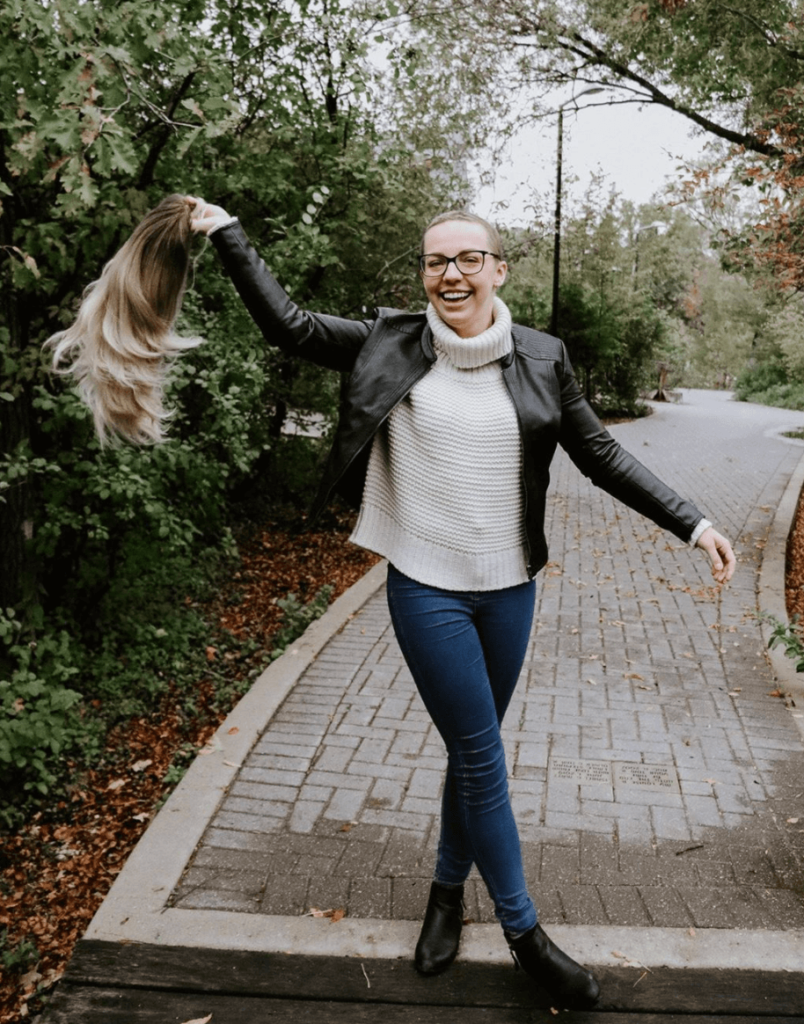
Last message to cancer patients
Know that everyone’s journey is much different. Just because treatment didn’t work for you or for someone else, it doesn’t mean it’s going to be the opposite way for you. Some people’s treatment plans are different. All the doctors treat differently.
Don’t be worried if the tests/treatments that you are getting aren’t the same as somebody else on the internet who has the same cancer.
Everyone’s body is different. Even though we have the same cancer, depending on our circumstances, our bodies handle things differently.
I really did a lot of research while I was sick. I tried to learn as much as I could about what my cancer was, what the effects of treatment were, how I can prevent them, how I can be healthier. It was a sense of control. I knew what was going on, and that’s how I feel calm when I can grasp what’s happening to me. I did a lot of research.
If you know what’s going on with you, you’re better prepared when you go for these different appointments. When there are different terms being tossed around, you know what they’re talking about. It helps you feel less anxious and more in control.
Just know everyone’s different and if you feel like that, do your research and understand what’s happening.
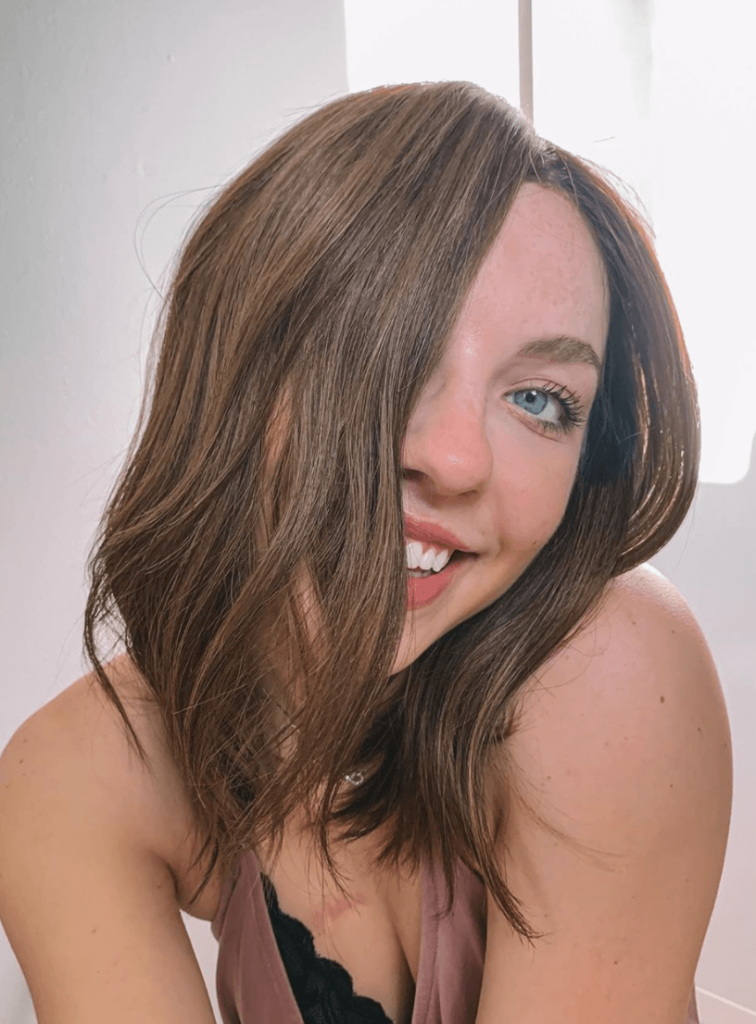
Inspired by Magdalena's story?
Share your story, too!
Primary Mediastinal B-Cell Lymphoma Stories
Arielle R., Primary Mediastinal (PMBCL)
1st Symptoms: Swollen neck lymph nodes, fever, appetite loss, weight loss, fatigue, night sweats, coughing, itchy skin, trouble breathing
Treatment: R-EPOCH (dose-adjusted) chemotherapy, 6 cycles
Keyla S., Primary Mediastinal (PMBCL), Stage 1
1st Symptoms: Bad cough, slight trouble breathing
Treatment: R-EPOCH (dose-adjusted) chemotherapy, 6 cycles
Donna S., Primary Mediastinal (PMBCL), Stage 1-2
1st Symptoms: Visible lump in center of throat, itchy legs, trouble swallowing
Treatment: R-EPOCH (dose-adjusted) chemotherapy, 6 cycles
Patrick M., Primary Mediastinal (PMBCL), Stage 2
1st Symptoms: Bump pushing up into sternum
Treatment: 6 cycles of DA-EPOCH-R (dose-adjusted) chemotherapy at 100+ hours each
Crystal Z., Primary Mediastinal (PMBCL), Stage 2
1st Symptoms: Chest pain
Treatment: 6 cycles of R-CHOP chemotherapy
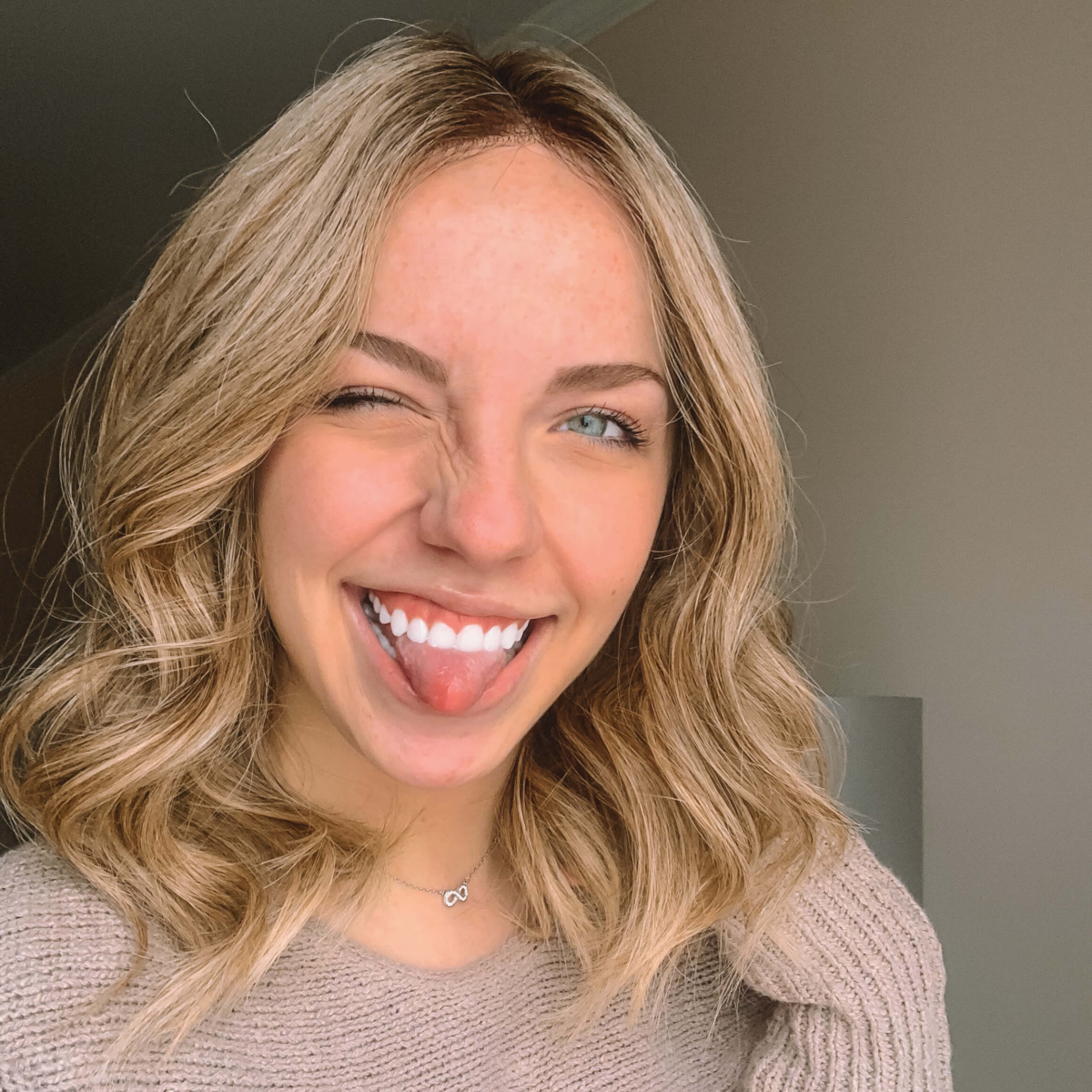
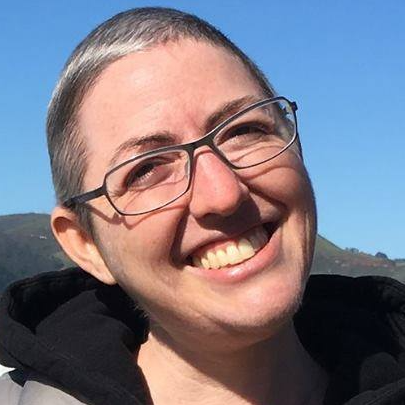
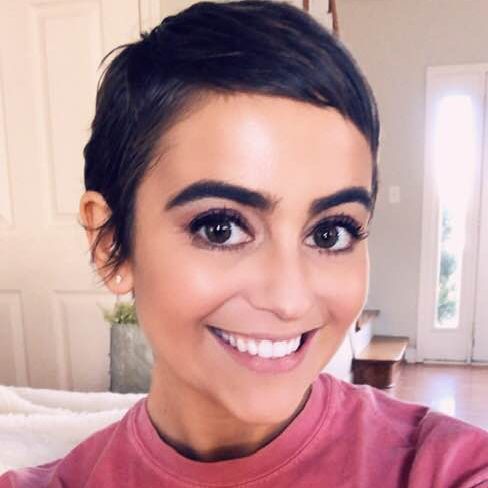
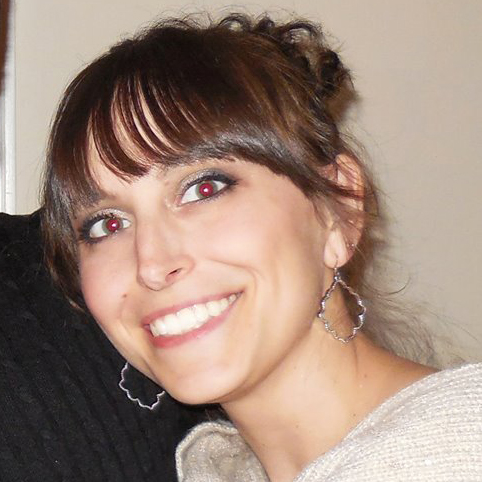
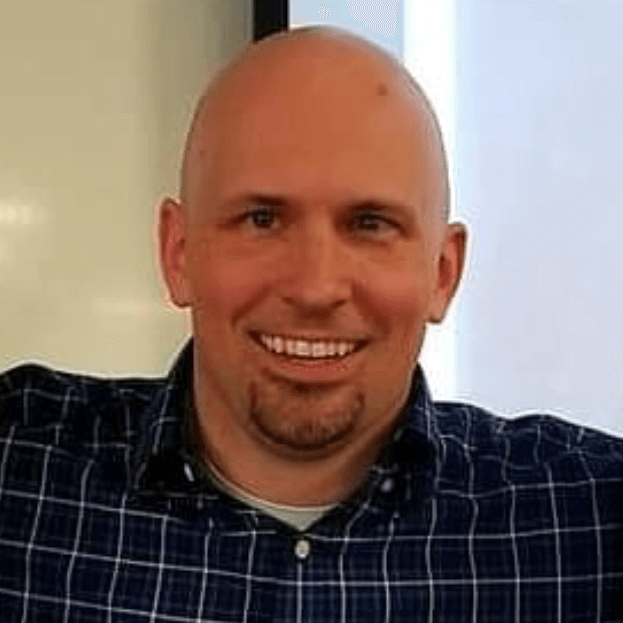
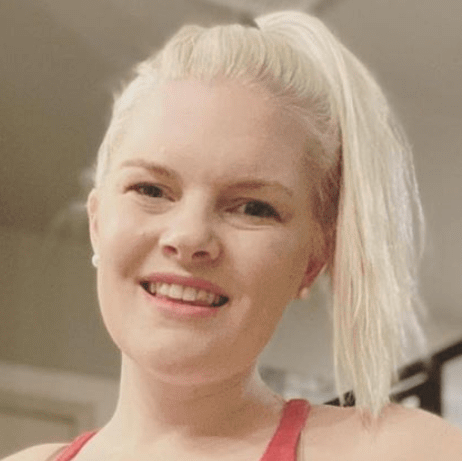
One reply on “Mags’ Stage 4 PMBCL Non-Hodgkin’s Lymphoma Story”
I have enjoyed reading all of these women’s cancer stories. I have a 24yo daughter who is expecting her first child and has a new diagnosis of PMBCL. She had her first chemo round last week. This has been such a scary time for us. To find out you have cancer a few weeks after finding out you are expecting your first child is something you never expect. Hearing stories like these is so helpful,
to see women who are on the other side and cured is so great. Thank you!